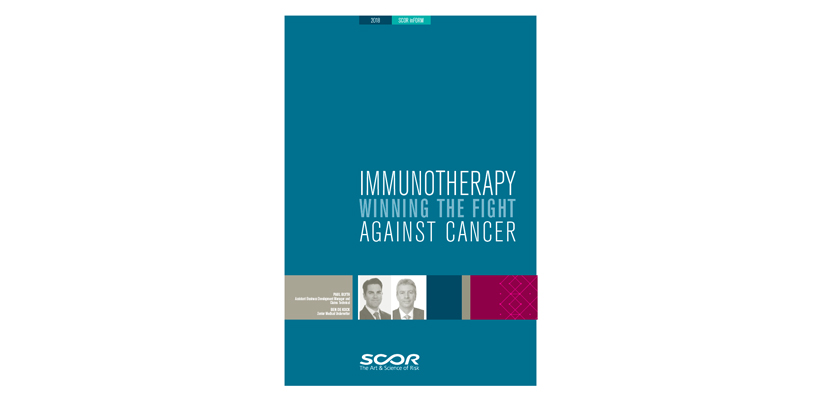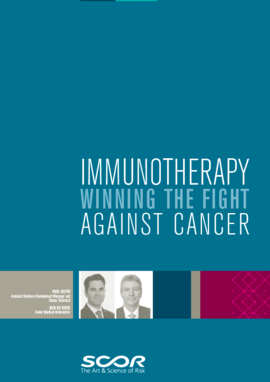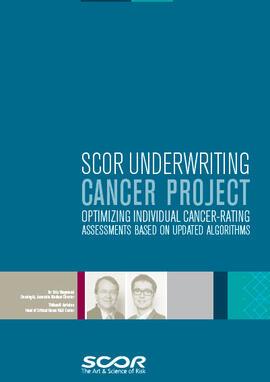
According to the World Health Organization, cancer is the 2nd leading cause of death worldwide and is estimated to have accounted for 9.6 million deaths in 2018. To mark World Cancer Day, SCOR Global Life claims & underwriting experts Paul Blyth and Ben de Kock discuss how immunotherapy improves the survival and quality of life for many people living with the disease.
The billions of dollars spent on cancer treatment research over the past five decades have led to significantly improved survival rates for many common cancers, particularly breast and colorectal cancer. Today, major breakthroughs in the long-term cure of patients with recurrent or metastatic disease are now possible with the use of immunotherapy, a revolutionary type of treatment that may turn many cancers currently considered to be terminal illnesses into a long-term chronic condition such as diabetes or multiple sclerosis.
How does immunotherapy work?
Immunotherapy is a type of cancer treatment that re-awakens the body’s immune system to reactivate the ability of T-cells to attack cancerous tumours. Unlike chemotherapy, immunotherapy does not use toxic drugs or radiation and is generally more tolerable with fewer side effects, although some (e.g. colitis, arthritis) can be severe and life-threatening.
Five main types of treatments:
- Monocolonal Antibodies – These are immune system proteins produced in the lab, which are designed to attach to specific targets found on cancer cells such as breast cancer and lymphomas. Some monoclonal antibodies mark cancer cells so that they will be better seen and destroyed by the immune system.
- Immune Checkpoint Inhibitors - Checkpoint inhibitors are currently the most promising type of immunotherapy by blocking immune checkpoints that allows the immune system to attack tumours. This type of immunotherapy has been approved for use in the treatment of metastatic melanoma and non-small cell lung cancer. Clinical trials are also under way in many other cancer types.
- Adoptive T-Cell Therapy - Immunotherapies can also target the immune cells directly. An example of this is where a patient’s T cells can be removed and those that will attack the tumour are grown in large batches in the lab and then reintroduced into the patient (much like stem cell therapy). In addition, T cells can be genetically modified so that they can recognise the tumour. This approach includes Chimeric Antigen Receptor (CAR) T cell therapies that have shown promise in clinical trials, particularly in leukaemia.
- Cancer Vaccines - Cancer vaccines can be used in two ways as cancer therapies. Prophylactic vaccines are used as a preventative measure such as the HPV (human papillomavirus) vaccine, which reduces the chance of having persistent HPV virus infections, the main cause of most cervical and oral cancers. Therapeutic vaccines work differently by treating an existing cancer by enhancing the immune response against particular tumour associated antigens (TAAs). This type of vaccine has been used to treat aggressive prostate cancers.
- Oncolytic Virus Therapy - Some viruses are being used to boost immune activity in cancer. These oncolytic (cancer-bursting) viruses act in two ways; they kill some cancer cells directly and activate the immune system to destroy non-infected cells (bystander effects). A herpes virus called T-VEC has recently been approved for use in melanoma and many other viruses are being tried in lab tests.
Claims & Underwriting Considerations
Though underwriting considerations and improved terms may take time to materialize, the impact on claims could be more immediate. For terminal illness claims in which a claimant is undergoing immunotherapy or combination therapy, a more cautious approach should be applied, and input by the Chief Medical Officer is highly recommended. For income protection claims, immunotherapy appears to be tolerated much better than traditional treatments such as chemotherapy and the hope is that patients will be able to maintain as normal a life as possible while they undergo treatment. Therefore, consideration will need to be given as to whether they will be capable of work. Regular contact on the telephone with the claimant or maybe even a nurse visit would be ideal in understanding their current state of health.
Read more about immunotherapy treatment for cancer and the impact on insurance in the SCOR publication below:
Click here to read the publication
To learn about the SCOR Underwriting Cancer Project, which more broadly addresses how life insurers can better estimate the excess mortality rate for newly diagnosed patients and long-term cancer survivors, read the September 2017 SCOR publication below:
Click Here to read the publication



